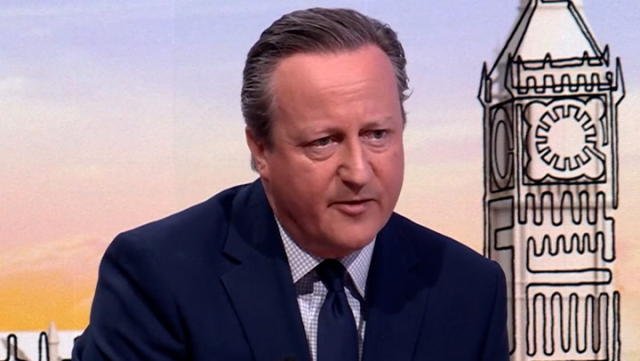Lord Cameron, speaking to the BBC, stated that while he opposes a major ground offensive in Rafah, the UK won’t follow the US in halting some arms sales to Israel.
Despite only providing 1% of Israel’s weapons, he cautioned that Israel must prioritize civilian protection and allow humanitarian aid.
Labour’s Jonathan Ashworth expressed opposition to British-made arms being used in Rafah, as US President Joe Biden signaled a significant shift in policy by conditioning arms supply on Israel’s actions in the southern Gazan city.
Amid reports of mass displacement and Israeli military buildup in Rafah, concerns persist over potential civilian casualties and a worsening humanitarian situation. Despite warnings from allies, Israel remains determined to pursue operations against Hamas in the area.
Lord Cameron emphasized the need for Israel to demonstrate its plan to safeguard civilians before endorsing a full-scale offensive. However, he noted the disparity between the US and UK positions, highlighting America’s significant role as a major arms supplier to Israel.
“Just to simply announce today that we will change our approach on arms exports, it would make Hamas stronger and it would make a hostage deal less likely,” he adds.
He expressed his preference for prioritizing the consistent effort to facilitate humanitarian aid delivery to Gaza.
The US State Department published a report on Friday, suggesting that Israel may have violated international humanitarian law by using American-provided weapons during the Gaza conflict.
When asked about his stance on the report’s findings, Lord Cameron criticized Israel’s handling of the situation, asserting that its performance regarding humanitarian aid access has been inadequate.
However, he highlighted the UK’s distinct approach, stating his lack of interest in symbolic gestures such as halting weapons sales as a means of sending messages.
Lord Cameron said: “I’m interested in what can we do to maximise the British pressure and the outcome that will help people in their lives – including getting the hostages, including British nationals, released.”
He dismissed the idea of British boots on the ground in Gaza, saying it was “a risk that we should not take”.
It comes after the BBC last month reported the government was considering sending British troops into Gaza to help deliver aid via a new sea route.
Labour MP Zarah Sultana accused the government of not following its own rules by supplying weapons to Israel.
The government’s Strategic Export Licensing Criteria prevents weapons sales “if there is a clear risk that the items might be used to commit or facilitate a serious violation of international humanitarian law”.
Ms Sultana said the scale of arms sales to Israel “does not matter”.
“We are aiding and abetting what are war crimes happening on a daily basis” she told the BBC.
Labour’s position on Gaza has shifted since the 7 October Hamas attacks, in which 252 people were kidnapped and about 1,200 killed, sparked a full-blown Israeli military operation in the area.
Since then more than 35,000 people have been killed and 78,000 others wounded in Gaza, according to the territory’s Hamas-run health ministry.
Last year, 10 Labour frontbenchers quit over the party’s failure to call for a ceasefire in Gaza as it instead backed a “humanitarian pause” to allow aid to flood into the country.
But in February, Labour began calling for an “immediate ceasefire” after the situation in Gaza “evolved”.
Mr Ashworth, a senior member of the shadow cabinet, said he did not “want to see British-made weapons used” in an invasion in Rafah.
“A full-scale offensive into Rafah will be a catastrophe beyond description,” he said.
He called on the government to publish the legal advice it has been given on arms sales to Israel.

